History of Olympic Weightlifting
Site Sponsors
 The Lift Up project is brought to you by chidlovski.com.
The Lift Up project is brought to you by chidlovski.com.
Olympic Legends @ Lift Up
Lift Up Site Search
Home ›› Feature Articles ››
Feature Articles @Lift Up
1984 International Friendship Cup ("Druzhba-84")
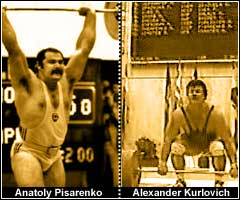
Analysis of Performance by the Olympic Weightlifters
by Y. Sandalov, USSR State Coach and S. Lepikov, Research Group Lead
Olympic Weightlifting Annual Journal, Moscow, Russia, 1985
Translation and Compilation by Arthur Chidlovski
The Soviet weightlifters won 17 gold medals and 9 silver medals at the Olympics 1976 and 1980 and international tournament Friendship Cup 1984.
The success of the Soviet Olympic weightlifting is due to mass sports development in the country, presence of modern specialized training facilities, qualified coaching staff, usage of scientific research methods - all the factors that determine high level of sportsmanship.
Our country has many highly qualified Olympic weightlifters - there are over 3,000 masters of sports and nearly 100 masters of sports international class. The numbers are going up every year. In the last four years, over 2,500 athletes reached the rank of Master of Sports and over 100 became Master of Sports of International Class (see Table 1). Needless to say, there is a trend of growing number of masters of sports among the athletes under 20 - the main candidates to the national team.
The last two Olympic cycles (1977-1980 and 1981-1984) showed that Team USSR and Team Bulgaria remain to be the strongest teams in the world. In several weight classes, there is a serious competitive level shown by athletes representing Hungary, East Germany, Cuba, North Korea, Poland and Czechoslovakia that shows the progress of Olympic weightlifting in the socialist countries.
In 1984, the world records in total belonged to USSR (5), Bulgaria (4) and East Germany (1). Top 10 lists of the athletes in the world are dominated by the Soviet athletes (especially, in the heavy weight classes).
Modern development of Olympic weightlifting in the USSR is determined by growing number of sports achievements, by the intensity of results in competitions, by the growth of youth athletes, by better technical and financial support of the sport and by the trend of the sport becoming younger. Needless to say, the success of the Team USSR was due to the fulfillment of the main Olympic training plans, individual plans, and collaborative creativity of the coaches and scientists.
| Criteria/Year | 1981 | 1982 | 1983 | 1984 |
|---|---|---|---|---|
| Number of Active Olympic Weightlifters | 332,030 | 330,901 | 330,382 | 349,254 |
| Number of Students in Youth Sports Schools | 40,914 | 40,713 | 46,309 | 53,362 |
| Number of Olympic Weightlifting Coaches | 2,573 | 2,840 | 2,836 | 3,038 |
| Number of Weightlifting Gyms and Halls | 1,393 | 1,191 | 1,221 | 1,262 |
| Number of Masters of Sports (new) | 633 | 612 | 592 | 456 |
| Number of Masters of Sports International Class | 40 | 78 | 89 | 73 |
In the past Olympic cycle, the intensity of national team training sessions had been increased and the unified system of training had been established. In comparison to the previous Olympic cycle, the amount of lifts in training went up from 18,000 to 24,000 reps and the amount of max or sub-max lifts (90% plus) reached 600.
The main goal of the Team USSR was its preparation for the XXIII Olympics. However, as it's known, due to the anti-Olympics policies of the US Administration and serious violations of the Olympic Chart, the Soviet athletes and other socialist athletes couldn't take part in the XXIII Olympics.
Absence of the best athletes at the XXIII Olympics significantly influenced the results shown at these competitions. The Table 2 shows a comparison between the results in total of the medallists of the 1984 Friendship Cup and 1984 Olympics - the 1984 Friendship Cup bronze medallists showed higher results than the champions of the 1984 Olympics. The athletes set 30 world records at the 1984 Friendship Cup including 18 records by the Soviets and 12 records by Bulgarians.
| Competition | Rank | Weight Class | |||||||||
|---|---|---|---|---|---|---|---|---|---|---|---|
| 52 | 56 | 60 | 67,6 | 75 | 82,5 | 90 | 100 | 110 | 110+ | ||
| 1984 Olympics | 1 | 235 | 267,5 | 282,5 | 320 | 340 | 350 | 392,5 | 385 | 390 | 412,5 |
| 2 | 235 | 265 | 280 | 312,5 | 335 | 342,5 | 360 | 382,5 | 380 | 410 | |
| 3 | 232,5 | 252,5 | 272,5 | 312,5 | 332,5 | 340 | 352,5 | 367,5 | 377,5 | 397,5 | |
| 1984 Friendship Cup | 1 | 252,5 | 297,5 | 322,5* | 337,5 | 377,5* | 405* | 422,5* | 427,5 | 442,5* | 465 |
| 2 | 232,5 | 295 | 315 | 335 | 362,5 | 385 | 400 | 390 | 427,5 | 462,5 | |
| 3 | 232,5 | 230 | 295 | 315 | 340 | 370 | 375 | 385 | 412,5 | 415 | |
There were significant changes in both Team USSR and Bulgaria. For example, the Soviet team was represented by only three athletes that competed at the 1980 Olympics (Y. Sarkisyan, Y. Vardanyan and L. Taranenko)
At the 1980 Friendship Cup, the Soviet team was changed on 70%; the average age was 24. Team Bulgaria went through changes. There were tree medallists of the 1980 Olympics - Y. Rusev, A. Zlatev and B. Blagoev; the average age was 22. During the 4-year cycle the results were significantly increased in total in comparison to 1980 Olympics - from 7.5 KG to 45 KG (except, the 67.5 class).
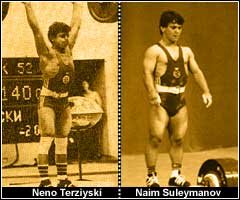
The analysis of the weightlifting results at the 1984 Friendship Cup shows that, in terms of physical, technical and psychological preparation in the majority of the weight classes (56, 60, 67.5, 75, 82.5, 90), the Soviet and Bulgarian athletes were equal and the results were determined by the tactical decisions.
In the 52KG class, Team USSR had no representation. The main battle took place between Bulgaria, Poland and Hungary. Bulgarian Neno Terziyski won in total by 20KG (252.5KG) over Bernard Piekorz (Poland, 2nd place) and Bela Olah (Hungary, 3rd place).
In the 56KG class, the competition for the first place was between Naim Suleymanov (Bulgaria) and Oxen Mirzoyan (USSR). Both snatched 132.5 KG (1KG above the world record). In the 4th attempt, Mirzoyan set a world record with the 133KG snatch.
Suleymanov was lighter than Mirzoyan and, therefore, the Soviet lifter had to clean-and-jerk 2.5KG more than his opponent. In his first attempt, Suleymanov clen-and-jerked 165 KG, Mirzoyan - 162.5 KG. Those results were final in the protocol of the competition. In the 2nd attempt, both tried to set a record with 170.5 KG. Finally, Suleymanov showed that he was better prepared for the tournament - he clean-and-jerked the world record (170.5 KG) in the 4th attempt. His total was 297.5 KG. Mirzoyan finished with 295KG.
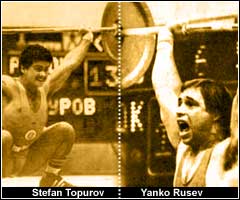
The 60KG class was marked as a tactical battle between Yurik Sarkisyan and two Bulgarians - Stefan Topurov and Anton Kodzhabashev. Sarkisyan was lighter than Topurov but heavier than Kodzhabashev. He opened with the 135KG snatch when Bulgarians lifted 130 and 132.5 accordingly. In the 2nd attempt, Sarkisyan tried to increase the world record by 1.5 KG, but afield because of a mistake he made during the explosion phase. In the 3rd attempt, Sarkisyan succeeded with the 140 KG. However, according to the rules, the world record went to Topurov who lifted before him. In the clean-and-jerk, Sarkisyan was able to lift 175 KG in the last attempt only (due to the mistakes in the jerk). Topurov went on with the records in the 3rd and 4th attempts - 182.5 KG and 185 KG accordingly. As a result, he set up a new world record in total - 322.5 KG. Sarkisyan's total was 315KG, Kodzhabashev's - 295 KG.
Two lifters represented Bulgaria in the 67.5 KG class - Yanko Rusev and Alexander Varbanov. The Soviet team was represented by V. Grachov (guest). In the snatch, both Bulgarians ended with 145 KG. In his 1st attempt, Grachov snatched 152.5 KG. However, he wasn't able to break the world record with 157.5 KG in the remaining attempts. In the clean-and-jerk, Bulgarians were obviously stronger than Grachov who ended up with 182.5 KG. Rusev lifted 192.5KG and Varbanov managed to break the world record (200 KG) in the 4th attempt. The results in total were: Rusev - 337.5 KG, Varbanov and Grachov - 335 KG.
The Soviet coach's hopeful in the 75KG class was Vladimir Kuzhetsov, the author of the world record in snatch. However, Kuznetsov wasn't able to completely use his physical and technical potential. His performance in the snatch was shaky - he snatched 162.5 KG only in his 2nd attempt. In his third attempt, he failed to lift 170 KG (2.5 KG above the world record). As for Bulgarian Zdravko Stoichkov, he snatched 167.5 KG in the third attempt and became a leader.
In the jerk, Kuznetsov succeeded with 200 KG in the 1st attempt, Stoichkov opened with 202.5 KG. Then, Stoichkov lifted 207.5 KG and 210 KG and set a new world record in total - 377.5 KG. Kuznetsov's bodyweight was lighter and he needed to jerk 215 KG. But both of his attempts failed because the athlete wasn't ready for this weight neither physically nor psychologically. In the 4th attempt, Stoichkov set a clean-and-jerk world record with 211 KG.
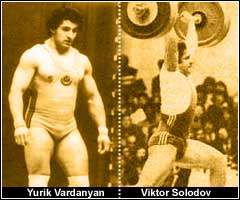
After competition in the first five classes, Bulgarian team won 5 gold medals, 1 silver medal and 1 bronze medal. The Soviet team had 3 athletes to compete and they won 3 silver medals.
The breakthrough for Team USSR began after outstanding lifting by Yurik Vardanyan in the 82.5 KG class. He set world records in snatch (182.5KG), in clean-and-jerk (224 KG) and in total (405 KG). Anatoly Khrapaty competed successfully as a guest athlete - he also set world records ( 181 KG snatch, 402.5 KG total). Bulgarian Asen Zlatev wasn't a competitive factor that day - his total was 385 KG.
Viktor Solodov won the 90 KG class where he broke world records in clean-and-jerk (233 KG) and in total (422.5 KG). Bulgarian Blagoy Blagoev lost 22.5 KG to Solodov and took the second place.
Bulgarian team skipped the 100 KG class. Pavel Kuznetsov, USSR, was the leader of the class. However, lack of competition affected negatively his performance. In addition, tactical team battle didn't let him to realize all his potential - he broke the world record only in the clean-and-jerk (241.5 KG). The medal winners in the class were the following: Pavel Kuznetsov (USSR) - 422.5 KG, Andor Sczanyi (Hungary) - 390 KG and Milos Cernik (Czechoslovakia) - 385 KG.
The main battle in the 110 KG class was between three Soviet and two Bulgarian athletes. Leonid Taranenko and Yury Zakharevich competed for team USSR. Valery Kravchuk lifted as a guest. Bulgaria was represented by Y. Georgiev and Veselin Osikovsky lifted as a guest. The first world record was set in the snatch by Zakharevich (197.5 KG). Taranenko replied with the record snatch of 200 KG. In the 4th attempt, Zakharevich raised the world record to 200.5 KG. Bulgarian Georgiev ended with the 182.5 snatch.
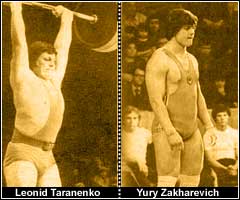
In the clean-and-jerk, both Soviet athletes opened with 230 KG. Then Taranenko jerked 242.5 KG. Zakharevich skipped 242.5 KG and went for 245 KG. He failed in both attempts. Possibly, he didn't completely psychologically recovered from the recent elbow surgery. The results were Taranenko - 442.5 KG (world record), Zakharevich - 427.5 KG, Georgiev - 412.5 KG.
The Soviet athletes also won the 1st and the 2nd place in the superheavy weight class*. Robert Skolimowski (Poland) was the 3rd with 415 KG in total.
By the end of the tournament, Team USSR won 5 gold and 5 silver medals. Team Bulgaria had 5 gold and 3 silver medals.
Comparison of successful attempts by teams USSR and Bulgaria (Table 3) shows that the Soviet athletes were more reliable in the snatch (75 %). The opposite results were in the clean-and-jerk. Reliability in clean-and-jerk was 67 % for Bulgaria and only 58 % for USSR. This proves that Bulgaria pays specific attention to the clean-and-jerk lifts in the preparation for the competitions.
| BULGARIA | USSR | ||||||
|---|---|---|---|---|---|---|---|
| Athlete, Class | Snatch | CJ | Total | Athlete, Class | Snatch | CJ | Total |
| Terziyski, 52 | 67 | 33 | 50 | Mirzoyan, 56 | 100 | 33 | 67 |
| Suleymanov, 56 | 100 | 33 | 67 | Sarkisyan, 60 | 67 | 33 | 50 |
| Topurov, 60 | 100 | 67 | 83 | V.Kuznetsov, 75 | 33 | 33 | 33 |
| Kodzhabashev, 60 | 33 | 67 | 50 | Vardanyan, 82,5 | 100 | 100 | 100 |
| Rusev, 67,5 | 67 | 100 | 83 | Solodov, 90 | 67 | 100 | 83 |
| Varbanov, 67,5 | 67 | 67 | 67 | P.Kuznetsov, 100 | 67 | 67 | 67 |
| Stoichkov, 75 | 100 | 100 | 100 | Taranenko, 110 | 100 | 67 | 83 |
| Zlatev, 82,5 | 67 | 33 | 50 | Zakharevich, 110 | 67 | 33 | 50 |
| Blagoev, 90 | 33 | 67 | 50 | ||||
| Georgiev, 110 | 33 | 100 | 67 | ||||
| Team Average | 66 | 67 | 67 | Team Average | 75 | 58 | 66 |
The analysis of the results shows that in order to increase the reliability in the lower weight classes (52-75 KG), the pre-competition phase should include a significant increase of the 90-100 % of max lifts in the jerk and that being 3-4 KG above the weight class border is not acceptable.
The overall analysis of the 4-year long preparation for the competition and performance at the competition shows high level of achieved results due to pre-planned system of training of the candidates to the national team. At the same time, not all candidates fully realized their potential in terms of physique, technique and physiological readiness. During the competition, there were several distinct shortcomings in the preparation of the national team athletes. First of all, it reflected on the psychological aspects, methodology of athletes' fasting and weight reduction and also the techniques of the jerk.
Another serious problem shown is a lack of candidates in the light weight classes (52-75 KG). This deficit can be explained by poor work of local sports organizations and coaches in republics, clubs and companies to recruit and prepare shorter athletes.
NOTE: * The authors Sandalov and Lepikov did not mention the names of superheavy weight winners in the article. Both Anatoly Pisarenko and Alexander Kurlovich were banned from Olympic weightlifting after they got arrested in Canada for an attempt to smuggle steroids in 1985 and literally became a tabu in the Soviet media of that time.
Back to Feature Articles
